Ukraine war: Six sporting lives lost - 'We will not forgive, or forget'
- Published

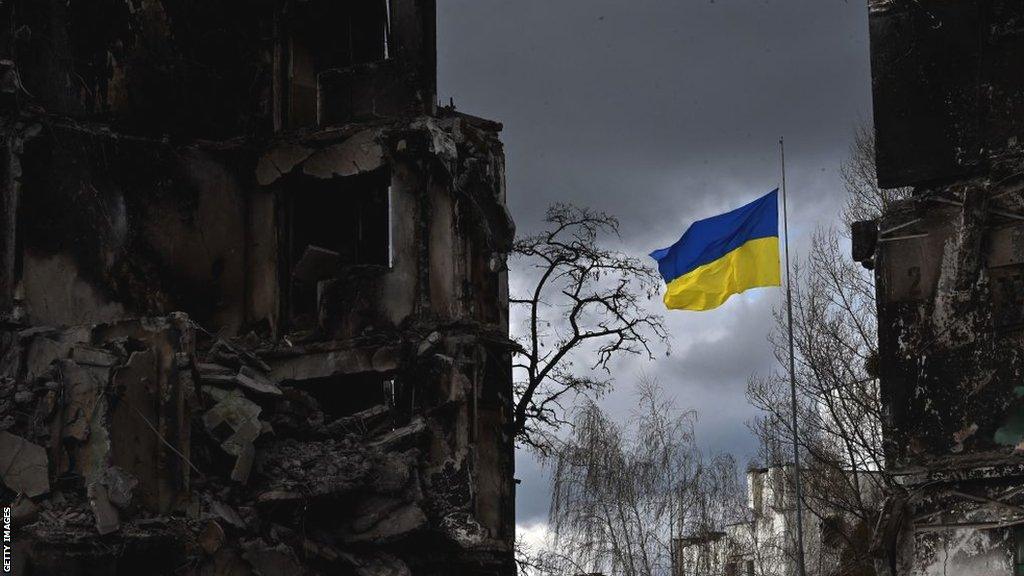
Numerous Ukrainian sportspeople signed up to fight after Russia invaded a year ago
When Ukraine awoke to the violent sound of Russian invasion in the early hours of 24 February 2022, its people had to make decisions.
According to the United Nations, some 100,000 people fled their homes on that first day of violence, thousands leaving the country entirely.
Others made the opposite journey. Vasiliy Lomachenko and Oleksandr Usyk - Ukraine's boxing superstars - donned fatigues and headed to the frontline.
While both have since been able to return to their sport, passion and profession, others have not been so fortunate.
More than 230 athletes, trainers and support staff have died since the start of the invasion. Another 15 have been wounded, 28 detained and four are missing, according to the Ukrainian government.
Vadym Gutzait, the country's minister of youth and sport, spoke of the "unspeakable pain" of losing compatriots who dreamed of representing their nation in competition, rather than in conflict.
"Bright and eternal memories of each and every one of those names will be inscribed in the history of our state as angels of both sport and Ukraine," he said.
"We will not forgive. We will not forget."
Here are the stories of six Ukrainian athletes killed during Russia's invasion, told by those who knew them best.
Dmytro Serbin - American Football
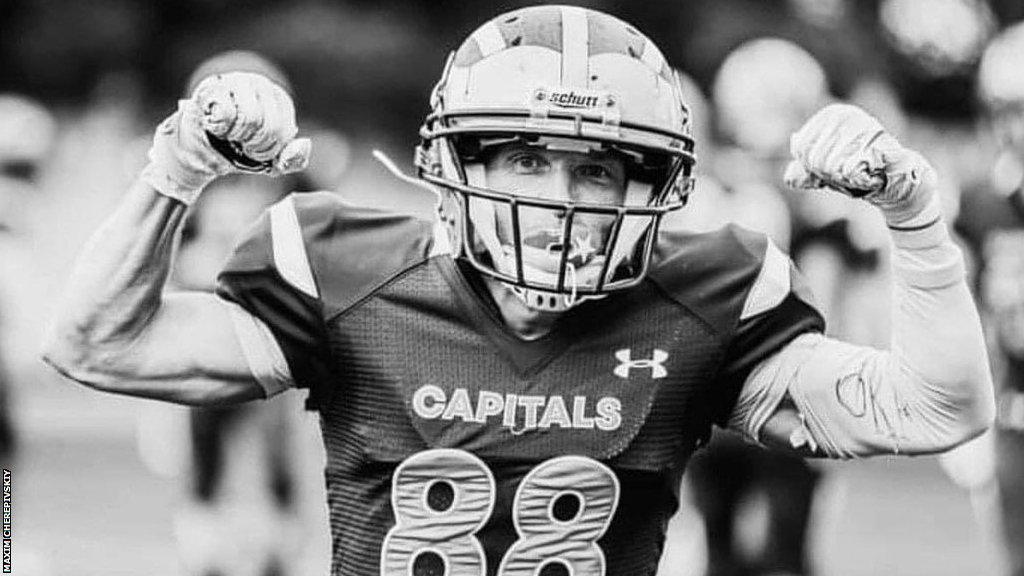
Serbin worked as a doctor, playing for the Kyiv-based Capitals in his spare time
"Dmytro was a man who had a big heart," says Maxim Cherepivskiy, quarterback for the Kyiv Capitals.
"He was a cool athlete, a great doctor and a good friend. He was a leader on the field and in life."
Serbin, 49, helped teach Cherepivskiy the game, and the pair became good friends as Cherepivskiy emerged as a key figure in the Kyiv Capitals team.
"He always called himself a lucky guy because there were always people around him who loved him for his positivity and kindness," says Cherepivskiy of his friend.
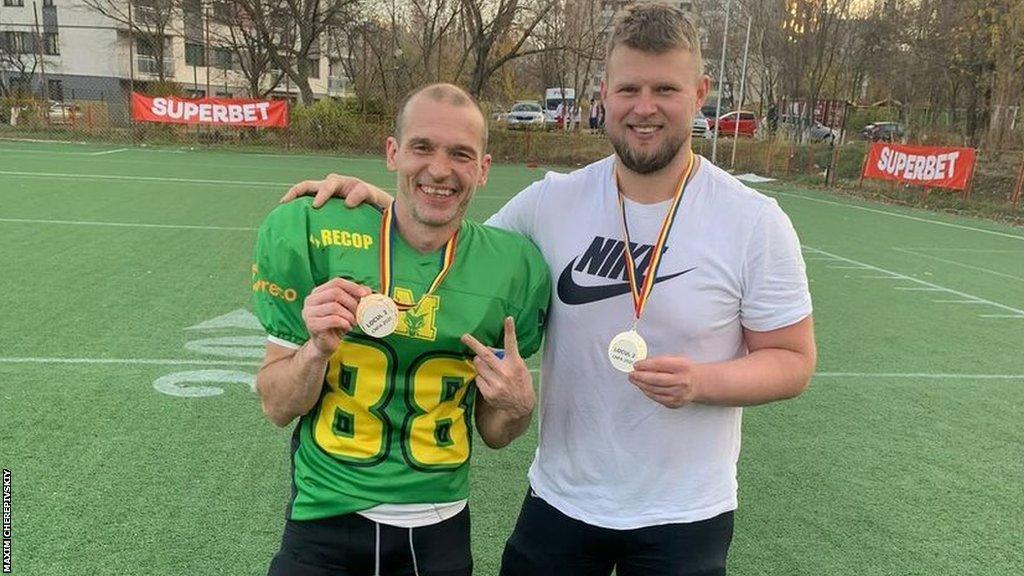
Serbin (left) introduced Maxim Cherepivskiy (right) to the game
Serbin was described as the oldest player in the league, but also the fastest.
The Kyiv Capitals announced Serbin's death in October, saying he was killed while evacuating wounded civilians.
His team posted a video, external showing moments from Serbin's life. It featured some of his touchdowns for the Capitals, post-match celebrations with his team-mates and him cutting an American Football-themed cake at a birthday party.
In one clip, Serbin throws a pass down a corridor at the hospital where he worked. He laughingly compares himself to Kansas City Chiefs quarterback Patrick Mahomes as he walks back towards the camera.
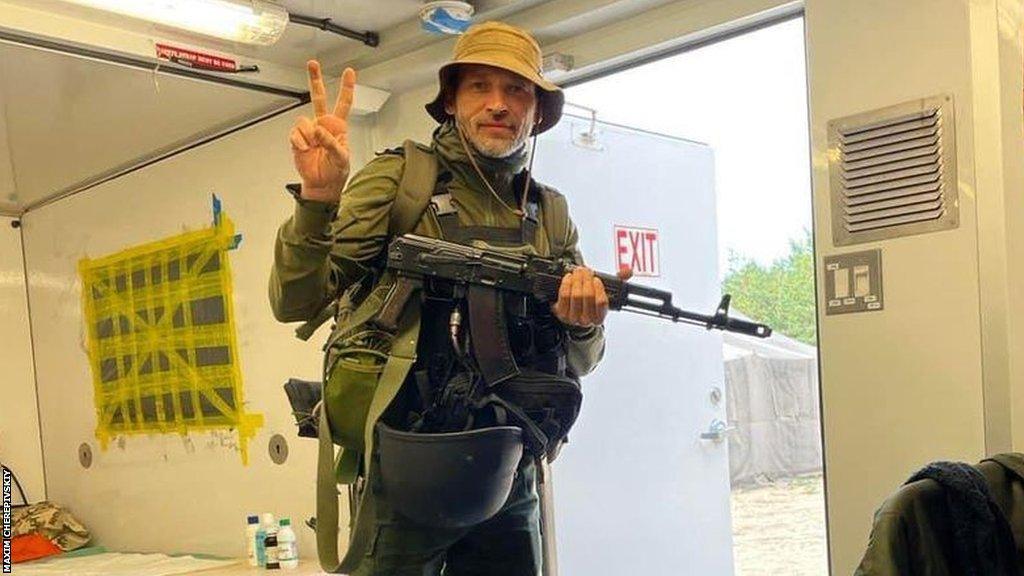
Serbin had given up his place in a car heading away from the frontline before he was killed
"He died as a soldier, defending his country and his relatives," the Kyiv Capitals said on Instagram.
According to Cherepivskiy, Serbin gave up his place in the car to take out more wounded soldiers.
"He was saving the lives of others, he was blown up by a mine," he told the BBC.
Oleksandr Sukhenko - Football
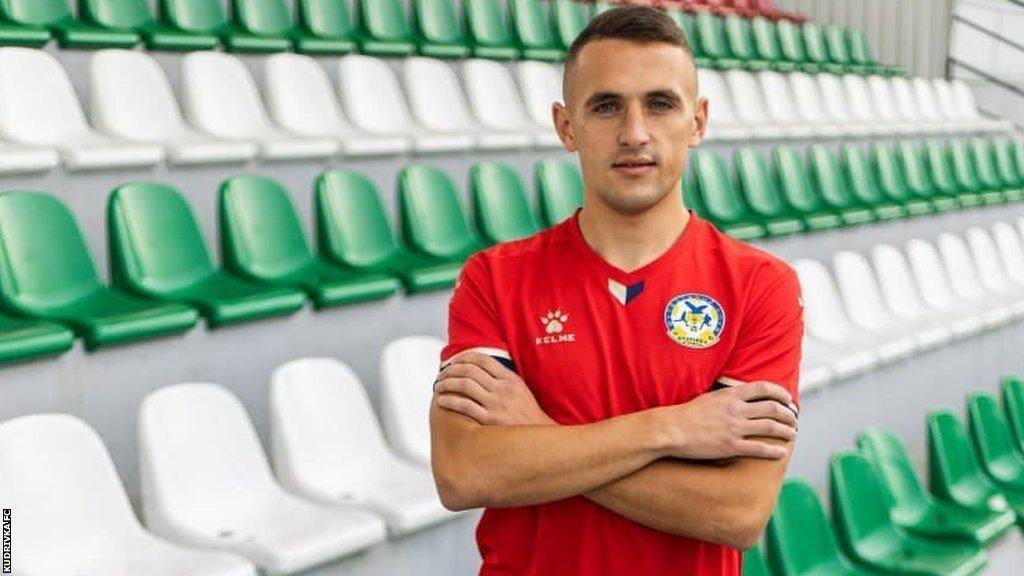
Sukhenko's body was found in the same shallow grave as those of his parents
Oleksandr Sukhenko was playing as a centre-forward at Kudrivka FC when the war broke out. He had played for one season with the team.
Kudrivka FC described the 25-year-old as a "talented football player" and good person.
"In matches, he repeatedly scored excellent goals and provided assists. He had a good speed and technique and understood well what was required of him on the field," the team told the BBC in a statement.
On 4 April, Sukhenko's sister Elena announced his death via the club's press team, describing how he had stayed behind with his parents to look after his home village of Motyzhyn, west of Kyiv.
Elena said her brother signed up to the territorial defence forces as soon as Ukraine was invaded.
He helped his parents set up processes so their village would be able to function during the war. But then the Russians arrived.
Sukhenko co-ordinated an evacuation from the village, helping form convoys and gathering information on the best time to leave. Elena and her husband were among those to escape.
Sukhenko helped distribute aid to remote parts of the village, alongside his parents.
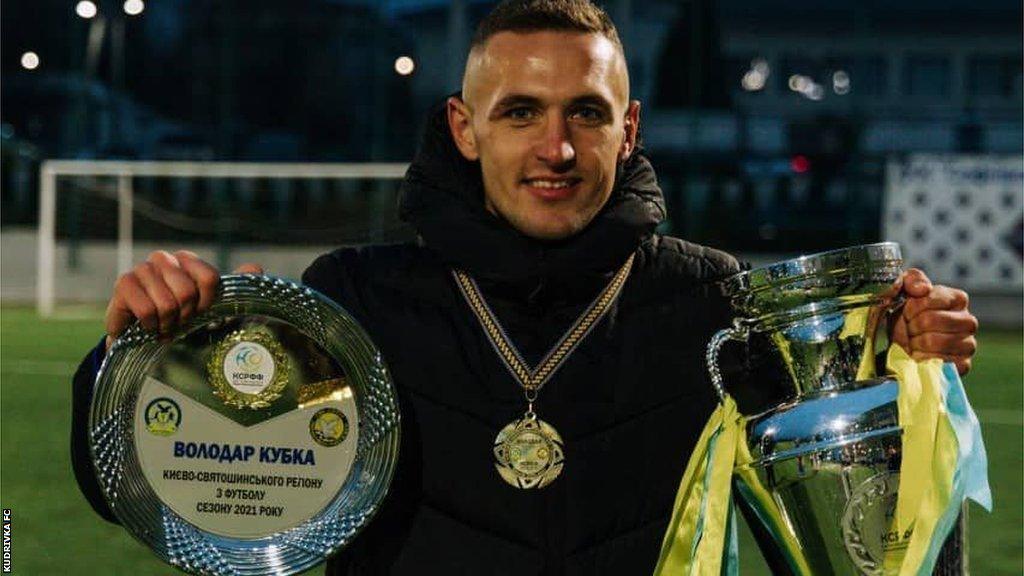
Sukhenko played as a centre forward or wide attacker
"He wanted to help so much and he did it," Elena said.
Sukhenko assured his sister every morning that everything was OK. But on 23 March, the Russians came to his parents' house. The soldiers took his car and left. A few hours later, his parents were taken away.
He told Elena that he had been promised they would return alive and he would remain at home waiting for them.
"But at 15:36 I received a text message that said 'Lena, everything is fine with us, the phone will be disconnected,'" she said.
It was the last she heard from him. His body, along with those of his parents, was found in a shallow pit in a forest just outside their village two weeks later.
Elena praised her brother and parents' bravery.
"They gave their lives for our village and our country. They did not give up," she said.
Oleh Leniuk - Orienteering
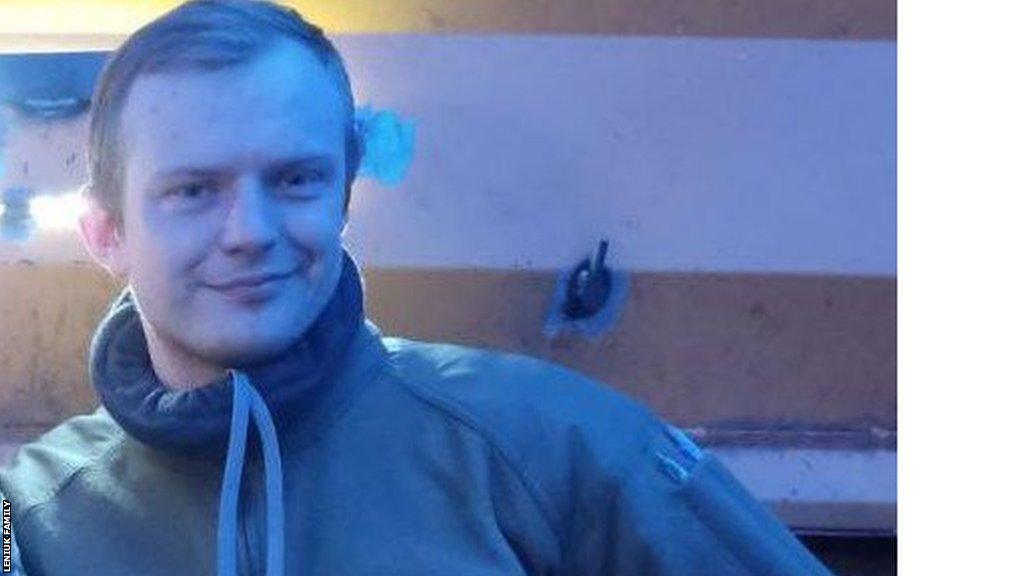
Orienteering had been a family passion that Leniuk inherited
Born in April 1999, Oleh Leniuk was brought up in the orienteering community.
At just eight, Leniuk started to run distances on his own. By 15, he had won the regional championship, beating adult competitors.
He progressed to Ukraine's youth and junior national teams and, in 2020, he won silver at the European Junior Rogaining Championship.
Aside from orienteering, Leniuk gained an undergraduate degree in applied mathematics and information technologies and a masters degree with honours in computer science.
Leniuk had interviews with a several information technology companies. He received job offers, but opted not to take them because it would not allow enough time to study and take part in sport.
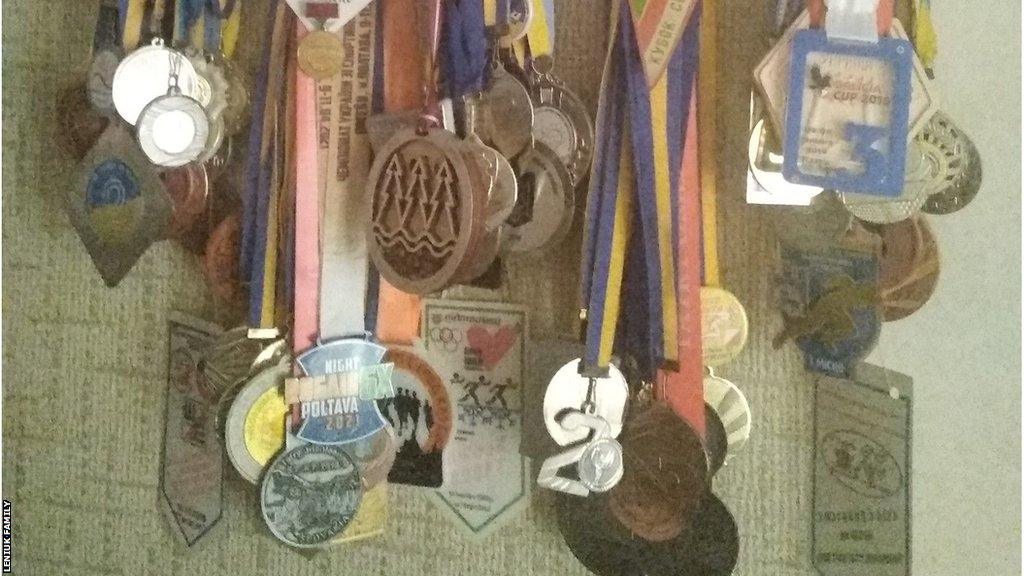
A selection of the medals and awards won by Leniuk during his orienteering career
Even before 24 February, Leniuk had made his decision about his next move. He held a family meeting with his father and brother, who knew they wanted to help Ukraine. They all signed up to serve in the military.
"He fought in the Kharkiv direction and thanks to their actions, it was possible to push the enemy to the east," his father said.
Leniuk was in touch with his father constantly. "When they left for an assignment, they turned off their phones for a day or two, then they were back in touch. I understand from the conversations it was very difficult for them, there was constant shelling."
Leniuk was 23 when he was killed in Kharkiv in May.
"He was a conscientious fighter, an honest and reliable comrade," Ukraine's ministry of youth and sports said. "During the war he proved to be a brave and enduring warrior."
Yevhen Obedinsky - Water polo
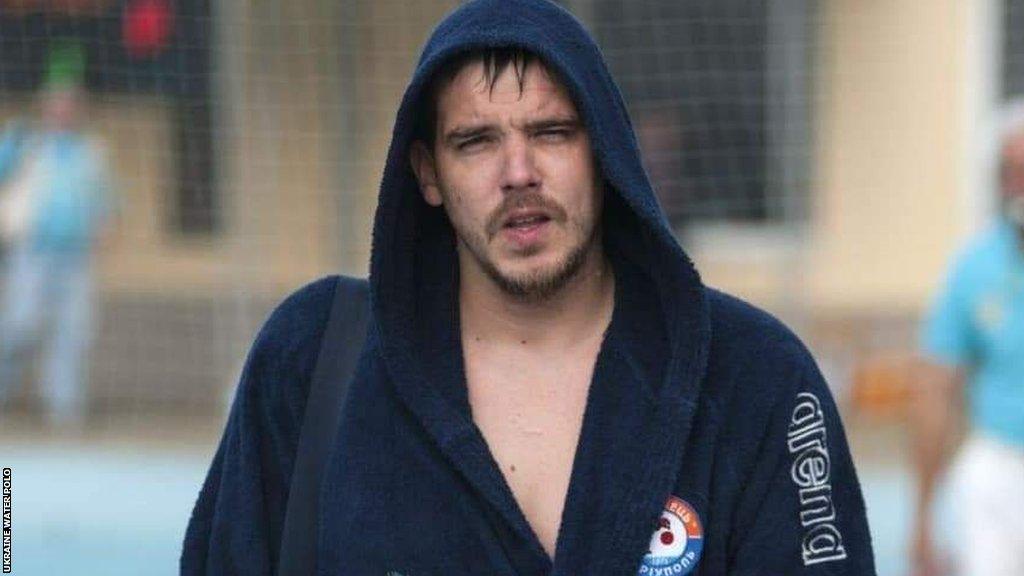
Obedinsky's death left his 12-year-old daughter Kira orphaned
Yevhen Obedinsky was a long-time captain of Mariupol's team and played for Ukraine's national team, skippering his country for part of his international career.
His father Oleksandr, a successful water polo athlete himself, was his coach.
"He was vivacious, sociable, persistent and never gave up," Ukraine's water polo association told the BBC.
The last time Obedinsky competed at tournament level was in 2020, when he competed in the Cup of Ukraine.
He stopped playing after being diagnosed with a brain tumour.
Obedinsky, 39, was killed on 17 March during Russian shelling on the city of Mariupol.
"He was a sensitive son, brother, father, friend and excellent athlete," his father said on social media after his death. "He was a great lover of life, never gave up and never complained about life, no matter how difficult it was for him.
"He always had one answer. 'Don't worry dad, I'll be fine.' We had a very warm and trusting relationship and we treated each other with love. It's a terrible pain and irreparable loss."
The family endured more heartache when his 12-year-old daughter Kira was injured trying to escape the city.
She was taken to a hospital in Russian-occupied Donetsk and, according to doctors, was set to be transferred to an orphanage in Russia. Kira still had her father's mobile phone, however, and managed to use Instagram to contact her grandfather to let him know her whereabouts.
After efforts by the Ukrainian government, her grandfather was permitted to collect her in April, making a four-day journey that involved flights to Moscow via Poland and Turkey, a train to Rostov and a car journey to Donetsk. Together they returned to Ukraine the same way.
Back home, Kira told CNN, external how she had been forced to leave her father's body beneath the rubble of their shelled home before a landmine left her peppered with shrapnel as she tried to flee the Russian forces in her home city.
Maksym Yalovtsov - rugby union and wrestling
Maksym Yalovtsov was 32 when he was killed in a battle with Russian forces in October.
A huge crowd turned up to his funeral, with people lighting flares for a man who was described by friends as "charismatic and a champion". , external
He was part of the rugby community, playing for a club in Kyiv.
"I met Maksym in around 2007 at rugby training in Kyiv," says Stanislav Gryschenko, a former team-mate. "He was a shy boy then. We started training together and played more than 30 matches for our club Aviator.
"He was always diligent in training. He played as a prop in the scrum. Such a position requires a lot of strength, endurance and courage. Maksym possessed all these qualities."
Gryschenko says Yalovtsov was a purposeful and sociable man, who could always be relied on. "He loved life, he gave people joy and laughter," he added.
Yalovtsov also took up wrestling and jiu-jitsu, taking part in the 2018 Rome International Open, external before going on to win a gold medal at a European Ju-jitsu tournament in 2021.
Herman Horodetskyi, a fellow jiu-jitsu athlete, said Yalovtsov had his own approach to sport, almost spiritual.
"He began mixed martial arts and had very good achievements. In the professional leagues, he didn't compete often - he had about five professional bouts.
"You couldn't imagine how phenomenal these fights were. He was always putting on an attractive performance for the fans. After his fights, he attracted thousands of fans around Ukraine."
Horodetskyi knew Yalovtsov for more than seven years. They became friends instantly.
"From two weeks of our friendship, it felt like I knew him my whole life," he said. "I miss everything about him. When I think about him, I can instantly see him right in front of me."
Yalovtsov was also a part of the Dynamo Kyiv fan organisation. After his death, fans held a sign with his name on during the team's match in Krakow, Poland. Shortly after the game, players took a picture with the sign to honour Yalovtsov.
Allow X content?
This article contains content provided by X. We ask for your permission before anything is loaded, as they may be using cookies and other technologies. You may want to read X’s cookie policy, external and privacy policy, external before accepting. To view this content choose ‘accept and continue’.
Dmytro Sydoruk - Archery
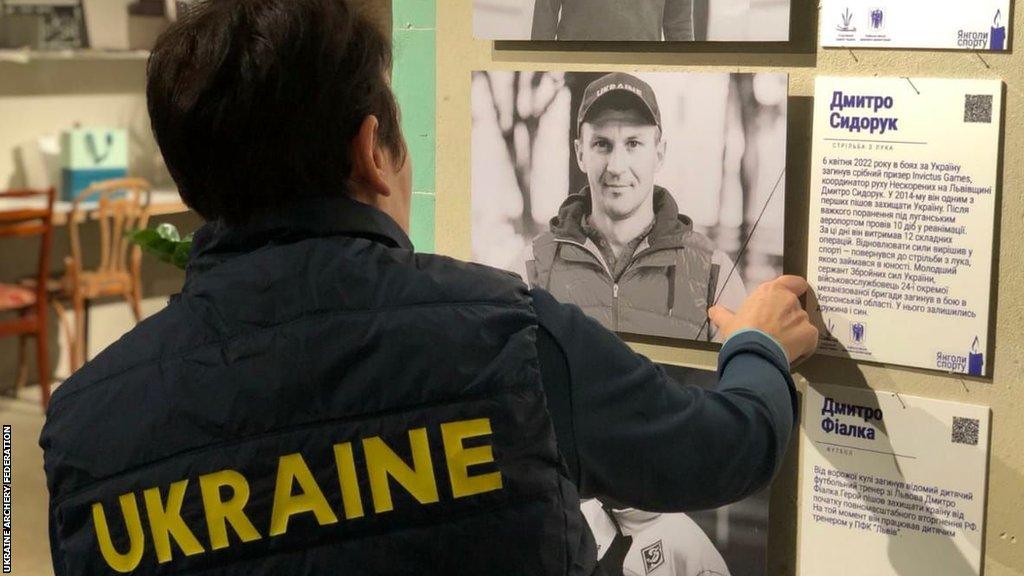
Sydoruk, in the black and white picture on the right, also fought against Russia's annexation of Crimea in 2014
Dmytro Sydoruk, known as Dima, was confident and loved the sport of archery, says his mother Inga. "He was always a sporty boy."
Sydoruk, 39, had tried swimming, but the local pool closed. A friend suggested he try archery instead. He fell in love with the sport.
In 2000, he was picked for the junior national team and the following year made it to the World Archery Youth Championship in Italy, winning a gold medal.
"When he went out, I said, 'Medal for mum please!' and the answer was, 'OK!' He always brought me back a medal with the words, 'Mum this is for you,'" Inga says.
Sydoruk volunteered to fight in 2014 when Russian forces annexed Crimea and was seriously wounded during an explosion in Luhansk. He went through 12 operations and months of rehabilitation, later returning to the front line.
"He had a goal and a great desire to do sports," his wife Andriana says. "What he wanted, he achieved. He is an example of never giving up."
Sydoruk was part of Ukraine's first team at the Invictus Games, external - an international event for injured servicepeople - winning silver in archery in Canada in 2017. He then became a coach.
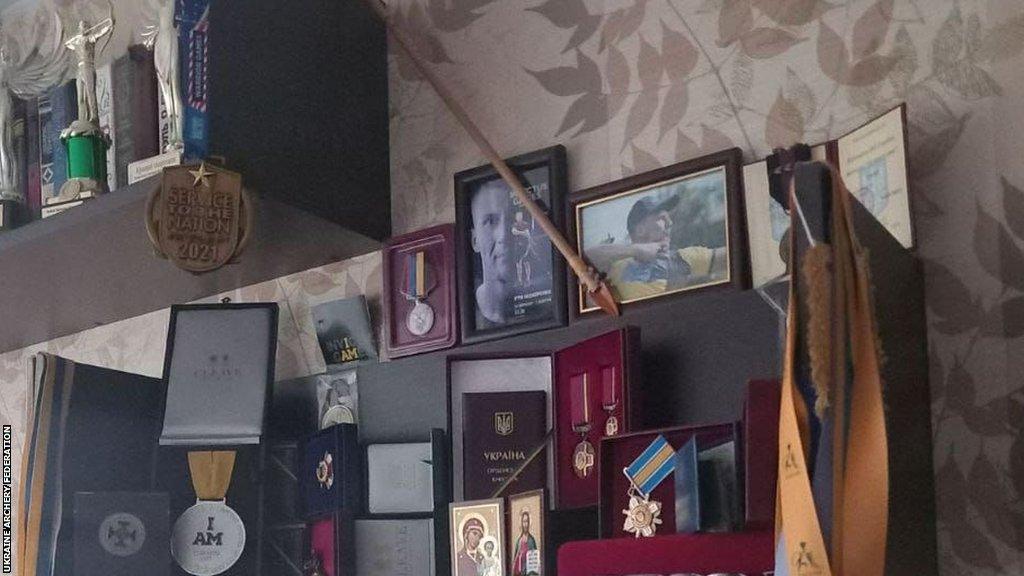
Sydoruk's medals included a silver at the 2017 Invictus Games
"The Invictus Games had a huge positive impact on him and became a part of his life. Dmytro put a lot of effort into developing the project in Ukraine and involving a large number of veterans in rehabilitation and sports," Volodymyr Dgula, a friend and archer, told the BBC.
Sydoruk signed up to fight again soon after the Russian invasion. He was killed on 5 April when the car he was travelling in was hit by a mortar mine, killing him and two other soldiers.
Sydoruk's mother still finds it hard to come to terms with his death.
"It is difficult to write the word 'was'," she says. "No, he is not 'was', he is in our hearts, in our thoughts and in our memories."